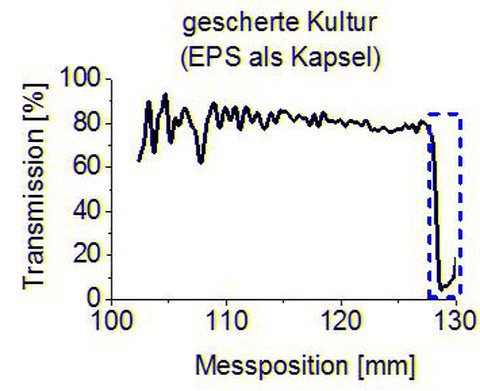Mechanische Beanspruchung als Vorbehandlungsschritt zur Separation EPS-produzierender bakterieller Starterkulturen: Einfluss auf Effizienz und Skalierbarkeit des Zentrifugationsschrittes
Bei der Herstellung von Backwaren, Sauerkraut und diversen Milchprodukten sind Milchsäurebakterien von essentieller Bedeutung. Die Produktion dieser Starterkulturen erfolgt fermentativ unter geeigneten Bedingungen bei definierter Temperatur, Nährmedienzusammensetzung und pH. An die Fermentation schließt sich zur Zellernte ein Separationsschritt mittels Zentrifugation an. Dies dient der Abtrennung der Zellen vom umgebenden Medium. Im industriellen Maßstab finden dazu üblicherweise Tellerseparatoren Verwendung. Im weiteren Prozess werden die so gewonnenen Starterkulturen nach Zugabe von Additiven gefrostet bzw. gefriergetrocknet, um Distributionsfähigkeit und Langzeitstabilität zu gewährleisten.
Als Starterkulturen werden eine Vielzahl hochspezialisierter Bakterienstämme mit verschiedenen Eigenschaften und Applikationsmöglichkeiten produziert und kontinuierlich weiterentwickelt. Dies erfordert eine flexible und individuelle Anpassung der Prozessparameter im Zuge der Herstellung. Hinsichtlich des Separationsschrittes existiert dazu großes Optimierungspotential, da maßgebliche produktbezogene Einflussfaktoren bisher kaum untersucht sind. Wünschenswert von Seiten der Industrie sind deshalb vor allem Skalierungsmodelle, mit denen bei neuentwickelten Kulturen aus Versuchen im Labor- und Technikums-Maßstab auf eine Auslegung des industriellen Prozesses geschlossen werden kann. Verbunden wäre dies mit erheblichen betriebswirtschaftlichen Vorteilen. Zwar existieren Skalierungsmodelle der Zentrifugation wie das Sigma-Modell von Ambler, diese liefern allerdings nur für anorganische partikuläre Systeme zufriedenstellende Ergebnisse. Im Fall biologischer Partikelsysteme gestaltet sich diese Aufgabe hingegen als weitaus komplexer.
Ziel des Vorhabens ist es, den Einfluss der EPS-Produktion einiger Milchsäurebakterienkulturen auf die Effizienz und Skalierbarkeit der Zentrifugation aufzuklären, um hierfür Prozessparameter zu optimieren. Da bislang nicht bekannt ist, weshalb und unter welchen Umständen sich eine vorangehende Homogenisierung bestimmter EPS-bildender Kulturen positiv auf ihr Separationsverhalten auswirkt, soll dieser Prozessschritt zuerst untersucht werden.
Kooperationspartner:
- Karlsruher Institut für Technologie (KIT, Karlsruhe, Lehrstuhl für Verfahrenstechnische Apparate
- Kompetenznetz Verfahrenstechnik Pro3 e.V., Stuttgart
Projektfinanzierung:
- AiF Industrielle Gemeinschaftsforschung via FEI, Förderkennzeichen: AiF 18605 B
Projektbearbeitung und Kontakt:
 © Surber
© Surber
Dr.-Ing. DLC Susann Mende
Biomakromoleküle
Eine verschlüsselte E-Mail über das SecureMail-Portal versenden (nur für TUD-externe Personen).
 © Surber
© Surber
PD Dr.nat.techn. et Ing.habil Doris Jaros
Produkttechnologien: Milch; Biomakromoleküle
Eine verschlüsselte E-Mail über das SecureMail-Portal versenden (nur für TUD-externe Personen).
 © Tobias Ritz
© Tobias Ritz
Senior Professor Dipl.-Ing. Dr. nat. techn. habil. Harald Rohm
Eine verschlüsselte E-Mail über das SecureMail-Portal versenden (nur für TUD-externe Personen).

